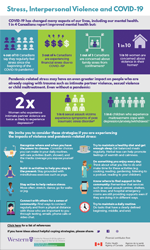Stress, Interpersonal Violence and COVID-19
COVID-19 has changed many aspects of our lives, including our mental health. Pandemic-related stress may have an even greater impact on people who are already coping with trauma such as intimate partner violence, sexual violence, or child maltreatment.
View Printable PDF Infographic
View PNG version
View Plain text PDF
COVID-19 has changed many aspects of our lives, including our mental health.
1 in 4 Canadians report improved mental health but:
- 4 out of 10 Canadians say they regularly feel stress since the beginning of the COVID-19 pandemic1
- 3 out of 4 Canadians are experiencing financial stress due to COVID –19 2
- 1 out of 3 Canadians are concerned about family stress from confinement3
- 1 in 10 women are concerned about violence in their homes COVID19, Mental Health and Gender-based Violence4
Pandemic-related stress may have an even greater impact on people who are already coping with trauma such as intimate partner violence, sexual violence or child maltreatment. Even without a pandemic:
- Women who experience intimate partner violence are twice as likely to experience depression5
- 1 in 6 sexual assault victims experience symptoms of posttraumatic stress disorder6
- 1 in 6 children who experience maltreatment cope with depression/anxiety/withdrawal.7
We invite you to consider these strategies if you are experiencing the impacts
of violence and pandemic related stress:
- Try to maintain a daily routine:Do tasks that have a clearly defined beginning, middle, and end.
- Recognize where and when you have the power to choose: Consider choices you can make in your daily routines, self-care activities (bath, shower), and the media coverage you expose yourself to.
- Build-in activities to help you stay in the present: Stay grounded with mindfulness exercises such as yoga.
- Stay active to help reduce stress:Move often, stretch, dance, go for walks or jog.
- Connect with others for a sense of community: Find ways to connect regularly and from a physical distance with those who are important to you through texting, emails, phone calls or video chat.
- Try to maintain a healthy diet and get enough sleep: Eat balanced meals regularly. Herbal teas can help promote feelings of warmth and calmness.
- Do something you enjoy every day:Think about what you like to do and make time for these activities (e.g. cooking, reading, gardening, listening to a podcast, reading to your children).
- Know where to find support in the community: Remember that services, such as sexual assault centres, shelters, crisis lines, and hospital emergency rooms are still providing supports even if they are doing it in different ways.
References
[1] Mental Health Commission of Canada. (April 2020). Canadians report an increase in feeling stressed regularly or all the time now compared to one month before COVID-19 (https://www.mentalhealthcommission.ca/sites/default/files/2020-05/nanos_covid_may_2020.pdf)
[2] Dujay, John (March 24, 2020). Almost 3 in 4 Canadians experiencing financial stress due to COVID-19: survey. HR Reporter. https://www.hrreporter.com/focus-areas/compensation-and-benefits/almost-3-in-4-canadians-experiencing-financial-stress-due-to-covid-19-survey/327855
[3] Statistics Canada, (April 8, 2020). Canadian Perspectives Survey Series 1: Impacts on COVID-19. https://www150.statcan.gc.ca/n1/daily-quotidien/200408/dq200408c-eng.htm
[5] World Health Organization. (November 29, 2017). Violence against women. Key facts. https://www.who.int/news-room/fact-sheets/detail/violence-against-women
[6] Conroy, S., Cotter, A. (2017). Self-reported sexual assault in Canada, 2014. Juristat: Canadian Centre for Justice Statistics.
[7] Fallon, B. et al. (2020). Ontario incidence study of reported child abuse and neglect- 2018. Toronto, ON: Child Welfare Research Portal.
All our resources are open-access and can be shared (e.g., linked, downloaded and sent) or cited with credit. If you would like to adapt and/or edit, translate, or embed/upload our content on your website/training materials (e.g., Webinar video), please email us at gbvln@uwo.ca so that we can work together to do so.







